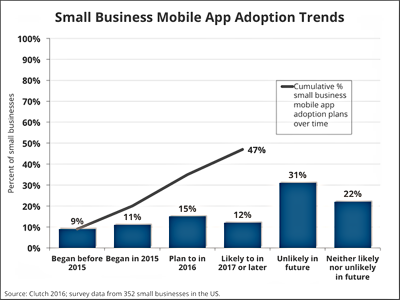Will cheaper, quick-to-create mobile apps convince more small businesses to make them? Not necessarily. While nearly half of small businesses say they plan to have a mobile app within the next few years, nearly a third (31%) still have no plans to do so, according to a survey on small business apps by tech research firm Clutch.
 But that wait-and-see attitude will likely change soon. That’s because as small businesses see other local businesses and competitors releasing mobile apps, they’ll be more motivated to create their own. Today’s younger consumers who’ve grown up with mobile devices have come to expect apps from their favorite businesses, so it’s smart to keep them loving you than to risk them leaving you.
But that wait-and-see attitude will likely change soon. That’s because as small businesses see other local businesses and competitors releasing mobile apps, they’ll be more motivated to create their own. Today’s younger consumers who’ve grown up with mobile devices have come to expect apps from their favorite businesses, so it’s smart to keep them loving you than to risk them leaving you.
A mobile app’s main function should be to engage customers and keep them engaged for life. Contrast that with the main purpose of most business websites, which is to simply help customers find and research your company–not to keep them coming back to your website. On the other hand, a great mobile app drives engagement and customer traffic.
“Three years ago, a small business might see 10% of its total traffic coming from mobile, but right now it’s closer to 70%,” says Viktor Marohnic, CEO of the mobile app creator Shoutem. “Within the next couple of years, the shift to a mobile app or a mobile-friendly site will become obvious.”
 Though only 20% of the small businesses surveyed currently have an app, that’s up from about 15% in Clutch’s small business apps survey last year. Of those businesses with an app, at least half of them said that they built it to increase sales, improve the customer experience, and compete in a target market.
Though only 20% of the small businesses surveyed currently have an app, that’s up from about 15% in Clutch’s small business apps survey last year. Of those businesses with an app, at least half of them said that they built it to increase sales, improve the customer experience, and compete in a target market.
Small business apps benefits
While more people are creating and downloading apps, most apps end up forgotten or deleted after just one or a few opens. The key then, is to engage customers enough to keep them using your app again and again. It’s no surprise that among the business surveyed that already have a mobile app, most proclaimed their app’s ability to drive customer loyalty was its most valuable benefit.
Beyond customer loyalty incentives, small business managers also listed other app features as important: social networking for increased customer engagement, the ability to send push notifications to customers, and the ability of customers to personalize the app–for example how often they want to be notified, and about what products or services.
Built-in location and payment services are also important features in small business apps. Customers now take payment features for granted on most business websites or online apps, so they’ll expect the same convenience when they want to order products or services while mobile.
“Cutting down the time in which someone can make an order or a purchase is a key factor,” says Zach Cusimano, COO of mobile app builder Bizness Apps. “Having that ability in their pocket is much easier than visiting a business or going on a desktop. If a business can convince someone to download their app, that person is essentially giving them a place in their pocket at all times.”
Which small business are creating apps?
 It’s also no surprise that the current leaders of the small businesses apps movement are consumer-facing businesses like restaurants, gyms, stores and professional services. By understanding the potential benefits and risks of a mobile app for customer interaction, and these retail businesses are hopefully building apps that encourage ongoing engagement. Some forward-thinking churches, social clubs, and events organizers are also investing in apps for their members, according to Shoutem’s Viktor Marohnic.
It’s also no surprise that the current leaders of the small businesses apps movement are consumer-facing businesses like restaurants, gyms, stores and professional services. By understanding the potential benefits and risks of a mobile app for customer interaction, and these retail businesses are hopefully building apps that encourage ongoing engagement. Some forward-thinking churches, social clubs, and events organizers are also investing in apps for their members, according to Shoutem’s Viktor Marohnic.
Also gaining momentum are internal business apps, as 17% of small businesses surveyed said they wanted an app to streamline internal processes and increase productivity. Not so long ago, building a single app could cost $40,000 or more, but with the boom in “do it yourself”, no-coding-needed app builder platforms, small businesses can begin to build a simple app from about $5 per month. Clutch has a handy online list of such app builders, which they’ve apparently vetted and even rated.
Small business owners are cautious about spending before seeing a clear return on investment (ROI), says Praveen Seshadri, the founder and CEO of internal business apps specialist Appsheet. “As a tech community,” he adds, “we need to build tools that match their needs (easy to adopt, low friction, solves their problems, self-serve, no initial cost to try) and just drive awareness.”
The Clutch survey is based on over 352 survey responses from small business owners and managers throughout the US. The majority of survey respondents were businesses with just 1-10 employees and less than $1 million in annual revenue–a true representation of small businesses according to the US Census Bureau.
This small business apps report is the last of four recent Clutch studies that examine the results of their second annual Small Business Digital Marketing Survey. The previous reports focused on search engine optimization (SEO), social media marketing, and website usage. You can see the full report here, as well as links to the other studies.
This story is based on reporting from Clutch’s Amanda Soderlund, with additional writing by MobileVillage Editor Gary Thayer.
.





